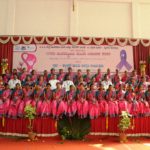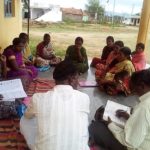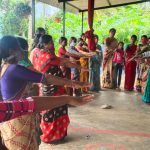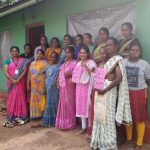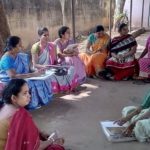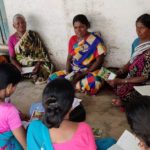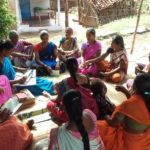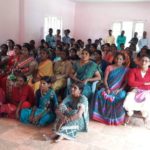WOMEN EMPOWERMENT PROGRAM
Since centuries, women in India have had a secondary status in society in comparison to men. A woman has to play the role of a good daughter, daughter-in-law, wife, mother and bread earner. In return, a woman has mostly been cornered and dominated by her family / husband / in-laws, and lives under their control, listening to them and compromising with their every wish. She is not treated equally in society and rarely allowed to voice her opinion.
The Women Empowerment program, one of the earliest interventions of ODP, was initiated In the beginning, village wise sanghas were formed with the focus of getting women to come together and provide them with a platform to discuss their problems and issues and find collective solutions to them.
With organization, women soon realized their strength in unity. They found that though individual sanghas were strong, if all the sanghas got together and formed a larger movement with more numbers, they would have much more power, especially when dealing with government agencies. This led to the formation of groups at different levels (Block / Taluk / District) and the apex women’s federation – MAHILODAYA
The program focus expanded to include aspects of – organization, savings, leadership, good local governance, environment, health, linkage building, tackling issues / problems, etc. so that there was a more integrated approach and recognition / visibility of women became more in the family and the community.
Today, the focus of the program is to strengthen the groups in the project areas, at all levels, i.e. SHG’s, Central Committees, Taluk / District level Federations and the apex federation MAHILODAYA, through development of active and focused leaders and effective group meetings so as to enable women become self governed and self managed and take forward the program by themselves.
Goal:
To enable poor and marginalized women gain equity, justice and a legitimate voice in their lives, families and society, empower them to have access and control over resources; and develop their abilities to exercise their rights with freedom – for integrated and sustainable development.
Objectives:
To develop courage, self-esteem, promote equality and respected status amongst poor and marginalized women in the society.
- Strengthen SHGs, Central Committees, Taluk & District level Federations and Apex body through trainings, awareness, exposure and learning sites and Initiate savings in SHGs in order to avoid exploitation by middle men/ money lenders and increase the income and assets of women.
- Build up capacity at grass root level leaders and groups to carry forward their activities effectively motivate women to them involve in the panchayath structures to enable good governance.
- Strengthen linkages with government departments & financial institutions to mobilize available schemes. Enable women to manage resource and expand their resource for livelihood.
ODP has 2144 SHG with 38742 , 203 CC with 3265 members. 25 Federations at Taluk/ Block level 5 Federations at District level and an apex federation called Mahilodaya Today women are much more self-confident and aware of their rights.
Best Practices WEP:
- Formation of 5 committees for integrated development.
- Growth of Leadership from 5 office bearers to 10 – 15 members.
- Formation of Taluk and District level federations to take up issues.
- Formation of Mahilodaya Federation as an umbrella to the Women empowerment program.
- Rotation of leadership every 2 years.
- Sustainability strategies developed systematically to maintain – CBO activities, trainings, staff and infrastructure.
MAJOR ISSUES TAKEN UP BY WEP:
- Anti Arrack movement – resulting in a government ban on arrack shops in 2004,
- Kavery water issue for non-release of water from Karnataka to TamiNadu.
- Communal clashes between Hindus & Muslims.
- Dowry harassment and Domestic violence issues – where women were abused, beaten, starved, burnt and murdered.
- Online lottery system – which is now banned.
- Price hike on food commodities and petrol.
- Improper actions in the government hospitals at Mandya and Mysore.
- Child marriage issues.
- Proper implementation of Panchayat Raj Act.
- Sexual assaults on Women and Children.
All the issues were taken up with protests, processions, posters slogans and submission of memoranda to concerned officers.

